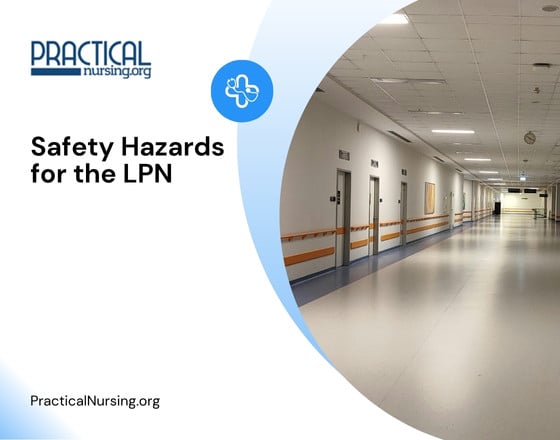Safety Hazards for the LPN


Eligibility and Admission Requirements
 A Licensed Practical Nurse is more at risk for work-related injuries than you might think. No matter where you work or what your job is, there is always going to be safety hazards. Along with these hazards, there are ways you can be safe. Nursing is an important job, and it’s equally important to be aware of safety.
A Licensed Practical Nurse is more at risk for work-related injuries than you might think. No matter where you work or what your job is, there is always going to be safety hazards. Along with these hazards, there are ways you can be safe. Nursing is an important job, and it’s equally important to be aware of safety.
Here are a few types of hazards you may encounter as an LPN:
Sharps
No matter what job field you may choose to go into, as an LPN you will be exposed to hazards regarding needles, scalpels, and other sharp objects. It is very important that you get rid of these objects in the correct containers, also known as “sharps containers”. Not only do you have the hazard of hurting yourself by sticking yourself with a needle or cutting yourself with a scalpel, but you also have the hazard of infecting yourself with HIV/AIDS or various other diseases that can be contracted from blood or other bodily fluids. A few ways to help prevent these injuries include always wearing gloves, and always putting these sharp materials in the disposal they belong to. Most of these disposals are bright red or have some sort of picture on them that will remind you that this is where the sharp materials go. Never try to recap a dirty needle, as this is bound to cause you an injury sooner or later, no matter how good you think you are at it. This is not something you should try to become good at doing.
Fall Risk
Of course you have heard of fall risk for patients, but have you ever heard of nurses being at risk for falling? Well, they are! While at work, nurses are responsible for lifting patients, transferring them, and other strenuous tasks. These alone are challenging, but doing these tasks for someone who has disabilities is even harder. LPNs can prepare for these duties by using support belts and/or utilizing moving equipment that workplaces may have available. As a nurse, you should never do anything alone if you do not feel comfortable, no matter how busy you and your co-workers may be. Keeping yourself and your patient safe are the top priorities.
Violence
No matter where you work as a nurse, you are always at risk for unanticipated violence. If you work in a nursing home, you will have many patients with Alzheimer’s or Dementia, and they may not be in the right state of mind. Residents with such conditions cannot always control or change their actions. You may encounter similarly aggravated patients at hospitals and clinics as well. No matter the workplace, it’s always best for you to be aware of your surroundings. You should always be thinking ahead of what to do if something were to happen, and although it is impossible to have a plan for every single thing that may go wrong, it is still helpful to have that mindset. Research any of your patients’ diagnoses that could potentially be dangerous to bystanders so that you are prepared, and look into how to reduce or diffuse triggers for those specific patients.
RELATED: Yes, LPN’s Can Work Somewhere Other Than a Nursing Home
Exposure to Germs
Handwashing is so important for LPNs. Yes, it may dry your hands out, so pack a small bottle of lotion to use regularly to keep yourself moisturized. You will learn over and over again in nursing school that handwashing is the single most important thing to do to keep away from infections. While handwashing is of dire importance, it is not foolproof, so always wear gloves in situations where you think you may come in contact with a person’s bodily fluids. In hospitals and other places where a serious hazard is suspected, they will post on the outside of the door what equipment you should don before entering. Always, always, always follow those directions; they are there for your own good and for your protection. You will never be able to dodge every hazard, risk, or workplace injury, but you can take steps in trying to prevent them. Always stay aware of your surroundings, know your patients and what they are capable of, wear the correct medical equipment at all times, and wash your hands again, and again, and again. Different facilities have policies they follow to reduce the number of some of these incidents occurring. If you have a workplace orientation, your employer will likely go over these policies with you. If you are given literature on safety precautions, read it carefully so that you fully understand it. Even if you are a nurse who has practiced for years, learning new methods to keep yourself and your patients safe is a good thing. Take your time when you are performing tasks that could ultimately cause you injury. You may be busy, but following safety protocol could save you and those around you from unnecessary injury or illness.
Related Articles
- Most Affordable LPN/LVN Programs for 2026: Your Path to Nursing Success on a Budget
- LPN / LVN History & Background
- LPN to RN Bridge Programs: Accelerating Career Growth for Practical Nurses
- You Will ALWAYS Be Learning!
- Nursing in Long Term Care
- Full Time Mother and LPN
- Culture of LPNs and RNs in Team Nursing
- How to Prepare for Your LPN/LVN Program Entrance Exam